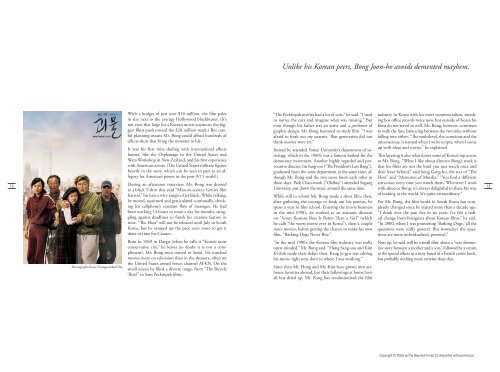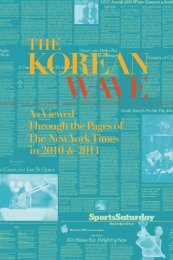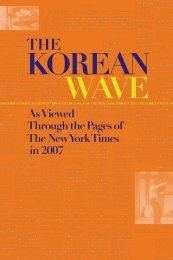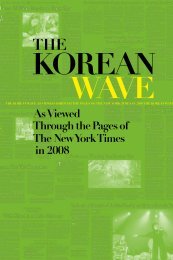The Korean Wave 2006 - Korean Cultural Service
The Korean Wave 2006 - Korean Cultural Service
The Korean Wave 2006 - Korean Cultural Service
Create successful ePaper yourself
Turn your PDF publications into a flip-book with our unique Google optimized e-Paper software.
Unlike his <strong>Korean</strong> peers, Bong Joon-ho avoids demented mayhem.<br />
12<br />
Photographs from ChungeorahmFilm<br />
With a budget of just over $10 million, the film pales<br />
in size next to the average Hollywood blockbuster. (It’s<br />
not even that large for a <strong>Korean</strong> movie anymore; the biggest<br />
films push toward the $20 million mark.) But careful<br />
planning meant Mr. Bong could afford hundreds of<br />
effects shots that bring the monster to life.<br />
It was his first time dealing with international effects<br />
houses, like the Orphanage in the United States and<br />
Weta Workshop in New Zealand, and his first experience<br />
with American actors. (<strong>The</strong> United States military figures<br />
heavily in the story, which can be seen in part as an allegory<br />
for American power in the post-9/11 world.)<br />
During an afternoon interview, Mr. Bong was dressed<br />
in a black T-shirt that read “Mise-en-scènes: Genres film<br />
festival,” his hair a wiry tangle of jet black. While talking,<br />
he moved, squirmed and gesticulated continually, checking<br />
his cellphone’s constant flow of messages. He had<br />
been working 14 hours or more a day for months, struggling<br />
against deadlines to finish his creature feature in<br />
time. “<strong>The</strong> Host” will not be released until July in South<br />
Korea, but he ramped up the pace even more to get it<br />
done in time for Cannes.<br />
Born in 1969 in Daegu (when he calls it “Korea’s most<br />
conservative city,” he leaves no doubt it is not a compliment),<br />
Mr. Bong soon moved to Seoul. He watched<br />
movies more on television than in the theaters, often on<br />
the United States armed forces channel AFKN. On the<br />
small screen he liked a diverse range, from “<strong>The</strong> Bicycle<br />
Thief” to Sam Peckinpah films.<br />
“<strong>The</strong> Peckinpah movies had a lot of cuts,” he said. “I used<br />
to notice the cuts and imagine what was missing.” But<br />
even though his father was an artist and a professor of<br />
graphic design, Mr. Bong hesitated to study film. “I was<br />
afraid to freak out my parents. That generation did not<br />
think movies were art.”<br />
Instead he attended Yonsei University’s department of sociology,<br />
which in the 1980’s was a famous hotbed for the<br />
democracy movement. Another highly regarded and provocative<br />
director, Im Sang-soo (“<strong>The</strong> President’s Last Bang”),<br />
graduated from the same department at the same time, although<br />
Mr. Bong said the two never knew each other in<br />
those days. Park Chan-wook (“Oldboy”) attended Sogang<br />
University, just down the street, around the same time.<br />
While still in school Mr. Bong made a short film, then,<br />
after gathering the courage to freak out his parents, he<br />
spent a year in film school. Entering the movie business<br />
in the mid-1990’s, he worked as an assistant director<br />
on “Seven Reasons Beer Is Better Than a Girl” (which<br />
he calls “the worst movie ever in Korea”), then a couple<br />
more movies, before getting the chance to make his own<br />
film, “Barking Dogs Never Bite.”<br />
“In the mid 1990’s the <strong>Korean</strong> film industry was really<br />
open-minded,” Mr. Bong said. “Hong Sang-soo and Kim<br />
Ki-duk made their debut then. Kang Je-gyu was editing<br />
his movie right next door to where I was working.”<br />
Since then Mr. Hong and Mr. Kim have grown into arthouse<br />
favorites abroad, but their followings at home have<br />
all but dried up. Mr. Kang has revolutionized the film<br />
industry in Korea with his overt commercialism, smashing<br />
box office records twice now, but outside of Korea his<br />
films do not travel so well. Mr. Bong, however, continues<br />
to walk the line, balancing between the two sides without<br />
falling into either. “<strong>The</strong> multilevel, the conscious and the<br />
unconscious, is natural when I write scripts, when I come<br />
up with ideas and stories,” he explained.<br />
This layering is also what draws some of Korea’s top actors<br />
to Mr. Bong. “What I like about director Bong’s work is<br />
that his films are not the kind you just watch once and<br />
then leave behind,” said Song Gang-ho, the star of “<strong>The</strong><br />
Host” and “Memories of Murder.” “You find a different<br />
attraction every time you watch them. Whenever I work<br />
with director Bong, it’s always delightful to share his way<br />
of looking at the world. It’s quite extraordinary.”<br />
For Mr. Bong, the film world in South Korea has completely<br />
changed since he started more than a decade ago.<br />
“I think over the past five or six years I’ve felt a radical<br />
change from foreigners about <strong>Korean</strong> films,” he said.<br />
“In 2000, when I was promoting ‘Barking Dogs,’ all the<br />
questions were really general. But nowadays the questions<br />
are more individualized, personal.”<br />
Next up, he said, will be a small film, about a “very destructive<br />
story between a mother and a son,” followed by a return<br />
to the special effects in a story based of a French comic book,<br />
but probably nothing more extreme than that.<br />
13<br />
Copyright © <strong>2006</strong> by <strong>The</strong> New York Times Co. Reprinted with permission.





